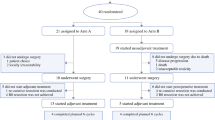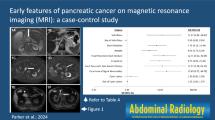Abstract
Pancreatic acinar cell carcinoma (PACC) is a very rare subtype of pancreatic cancer. Due to small number of patients, no standard chemotherapy protocol has been established. We experienced an extremely rare case of PACC with liver metastasis that showed a pathological complete response after modified FOLFIRINOX (mFFX) therapy. A 42-year-old man who underwent distal pancreatectomy for an 80 mm tumor at the pancreatic tail 3 years ago was referred to our hospital in September 2017 for the treatment of a recurrent liver tumor. Percutaneous biopsy revealed an acinar-neuroendocrine carcinoma, similar to the surgical specimen. He received eight cycles of irinotecan plus cisplatin chemotherapy. However, the tumor increased in size, and treatment was switched to mFFX therapy. The tumor in the liver shrank remarkably after nine cycles of mFFX therapy. Conversion surgery was selected, and the patient underwent hepatic left and caudate lobectomy 8 months after administration of mFFX. The resected specimen showed no viable tumor cells, indicating a pathological complete response. The histological diagnosis was reconsidered, and PACC was finally diagnosed via an additional immunohistological review. The patient has remained well with no recurrence for 6 years after surgery. This study is the first to report a case of pathological complete response with mFFX therapy for the recurrence of PACC.





Similar content being viewed by others
References
Xing-Mao Z, Hong-Juan Z, Qing L, et al. Pancreatic acinar cell carcinoma-case report and literature review. BMC Cancer. 2018;18:1083.
Béchade D, Desjardin M, Salmon E, et al. Pancreatic acinar cell carcinoma. Case Rep Gastroenterol. 2016;10:174–80.
Glazer ES, Neill KG, Frakes JM, et al. Systematic review and case series report of acinar cell carcinoma of the pancreas. Cancer Control. 2016;23:446–54.
Sridharan V, Mino-Kenudson M, Cleary JM, et al. Pancreatic acinar cell carcinoma: a multi-center series on clinical characteristics and treatment outcomes. Pancreatology. 2021;21:1119–26.
Siegel RL, Miller KD, Fuchs HE, et al. Cancer statistics, 2021. CA Cancer J Clin. 2021;71:7–33.
Zhou W, Han X, Fang Y, et al. Clinical analysis of acinar cell carcinoma of the pancreas: a single-center experience of 45 consecutive cases. Cancer Control. 2020;27:1073274820969447.
Takahashi H, Ikeda M, Shiba S, et al. Multicenter retrospective analysis of chemotherapy for advanced pancreatic acinar cell carcinoma: potential efficacy of platinum- and irinotecan-containing regimens. Pancreas. 2021;50:77–82.
Wang Y, Wang S, Zhou X, et al. Acinar cell carcinoma: a report of 19 cases with a brief review of the literature. World J Surg Oncol. 2016;14:172.
Hartwig W, Denneberg M, Bergmann F, et al. Acinar cell carcinoma of the pancreas: is resection justified even in limited metastatic disease? Am J Surg. 2011;202:23–7.
Yoshida N, Kanno A, Masamune A, et al. Pancreatic acinar cell carcinoma with multiple liver metastases effectively treated by S-1 chemotherapy. Intern Med. 2018;57:3529–35.
Yoo C, Kim BJ, Kim KP, et al. Efficacy of chemotherapy in patients with unresectable or metastatic pancreatic acinar cell carcinoma: potentially improved efficacy with oxaliplatin-containing regimen. Cancer Res Treat. 2017;49:759–65.
Sugimoto M, Hines OJ, Dawson DW, et al. Preoperative treatment with FOLFIRINOX and successful resection for a patient with mixed acinar-endocrine carcinoma of the pancreas. Pancreas. 2017;46:e32–4.
Yoshihiro T, Nio K, Tsuchihashi K, et al. Pancreatic acinar cell carcinoma presenting with panniculitis, successfully treated with FOLFIRINOX: a case report. Mol Clin Oncol. 2017;6:866–70.
Hashimoto M, Hikichi T, Suzuki T, et al. Successful chemotherapy with modified FOLFIRINOX for pancreatic acinar cell carcinoma. Clin J Gastroenterol. 2017;10:564–9.
Callata-Carhuapoma HR, Pato Cour E, Garcia-Paredes B, et al. Pancreatic acinar cell carcinoma with bilateral ovarian metastases, panniculitis and polyarthritis treated with FOLFIRINOX chemotherapy regimen. A case report and review of the literature. Pancreatology. 2015;15:440–4.
Schempf U, Sipos B, König C, et al. FOLFIRINOX as first-line treatment for unresectable acinar cell carcinoma of the pancreas: a case report. Z Gastroenterol. 2014;52:200–3.
Di Marco M, Carloni R, De Lorenzo S, et al. Long-term survival of two patients with recurrent pancreatic acinar cell carcinoma treated with radiofrequency ablation: a case report. World J Clin Cases. 2020;8:1241–50.
Sumiyoshi T, Shima Y, Okabayashi T, et al. Long-term survival following pancreatectomy and S-1 chemotherapy for pancreatic acinar cell carcinoma with peritoneal dissemination: a case report and literature review. Medicine (Baltimore). 2015;94: e378.
Minakawa K, Oka K, Nihei T, et al. Pancreatic endocrine tumor with partial acinar cell differentiation. APMIS. 2006;114:720–5.
Martin SK, Agarwal G, Lynch GR. Subcutaneous fat necrosis as the presenting feature of a pancreatic carcinoma: the challenge of differentiating endocrine and acinar pancreatic neoplasms. Pancreas. 2009;38:219–22.
Ohike N, Kosmahl M, Kloppel G. Mixed acinar-endocrine carcinoma of the pancreas. a clinicopathological study and comparison with acinar-cell carcinoma. Virchows Arch. 2004;445:231–5.
La Rosa S, Adsay V, Albarello L, et al. Clinicopathologic study of 62 acinar cell carcinomas of the pancreas: insights into the morphology and immunophenotype and search for prognostic markers. Am J Surg Pathol. 2012;36:1782–95.
La Rosa S, Franzi F, Marchet S, et al. The monoclonal anti-BCL10 antibody (clone 331.1) is a sensitive and specific marker of pancreatic acinar cell carcinoma and pancreatic metaplasia. Virchows Arch. 2009;454:133–42.
Hosoda W, Sasaki E, Murakami Y, et al. BCL10 as a useful marker for pancreatic acinar cell carcinoma, especially using endoscopic ultrasound cytology specimens. Pathol Int. 2013;63:176–82.
Ide Y, Otsuka T, Shimokawa M, et al. Conversion surgery for unresectable pancreatic cancer treated with FOLFIRINOX or gemcitabine plus nab-paclitaxel. Anticancer Res. 2023;43:1817–26.
Furuse J, Shibahara J, Sugiyama M. Development of chemotherapy and significance of conversion surgery after chemotherapy in unresectable pancreatic cancer. J Hepatobiliary Pancreat Sci. 2018;25:261–8.
Schneitler S, Kropil P, Riemer J, et al. Metastasized pancreatic carcinoma with neoadjuvant FOLFIRINOX therapy and R0 resection. World J Gastroenterol. 2015;21:6384–90.
Acknowledgements
We would like to thank S. Tsuruta for processing surgical specimens and giving pathological findings and Editage (www.editage.com) for English language editing.
Author information
Authors and Affiliations
Corresponding author
Additional information
Publisher's Note
Springer Nature remains neutral with regard to jurisdictional claims in published maps and institutional affiliations.
Rights and permissions
Springer Nature or its licensor (e.g. a society or other partner) holds exclusive rights to this article under a publishing agreement with the author(s) or other rightsholder(s); author self-archiving of the accepted manuscript version of this article is solely governed by the terms of such publishing agreement and applicable law.
About this article
Cite this article
Teramatsu, K., Fujimori, N., Murakami, M. et al. Pathological complete response with FOLFIRINOX therapy for recurrence of pancreatic acinar cell carcinoma. Clin J Gastroenterol (2024). https://doi.org/10.1007/s12328-024-01983-2
Received:
Accepted:
Published:
DOI: https://doi.org/10.1007/s12328-024-01983-2




